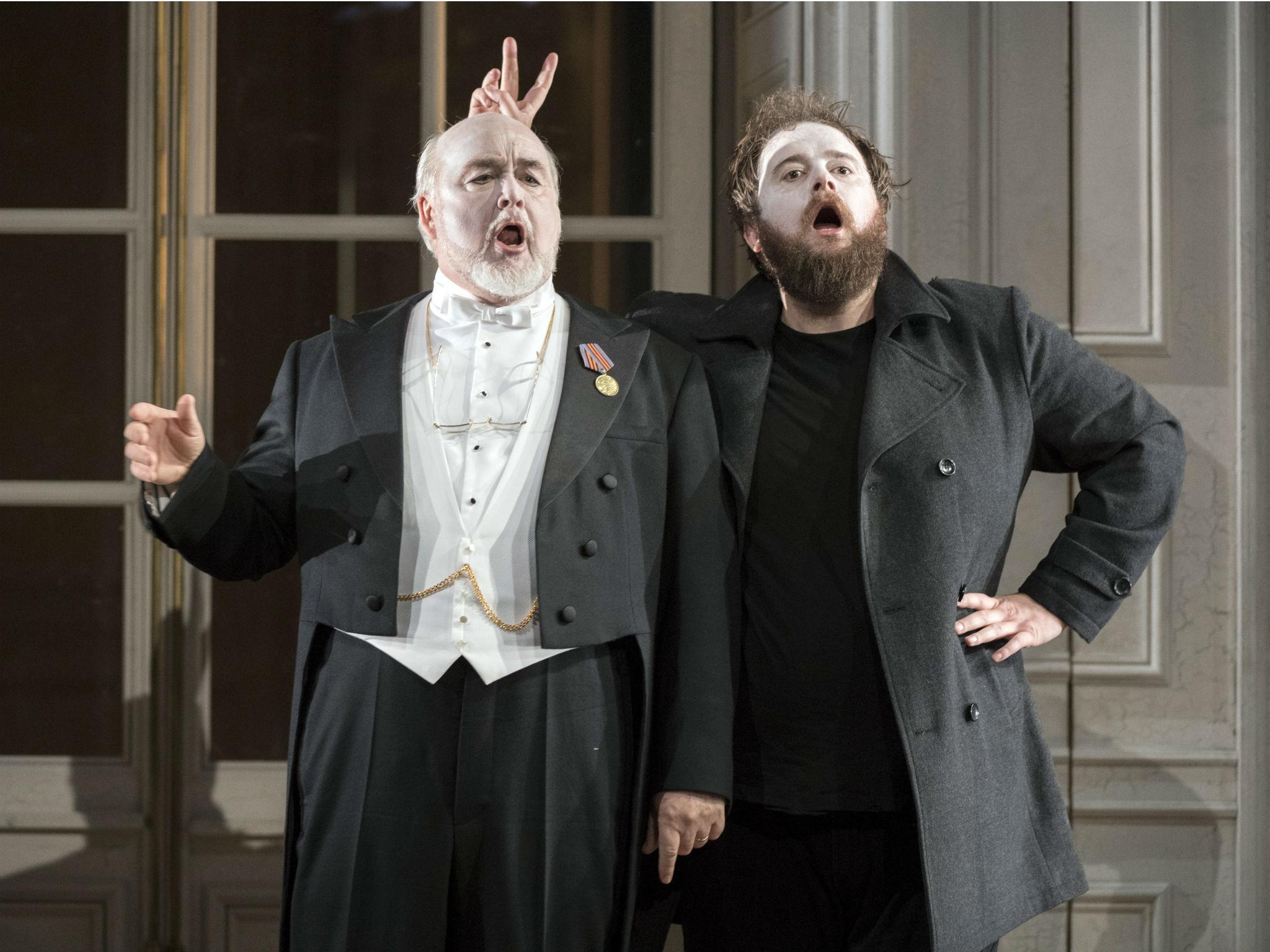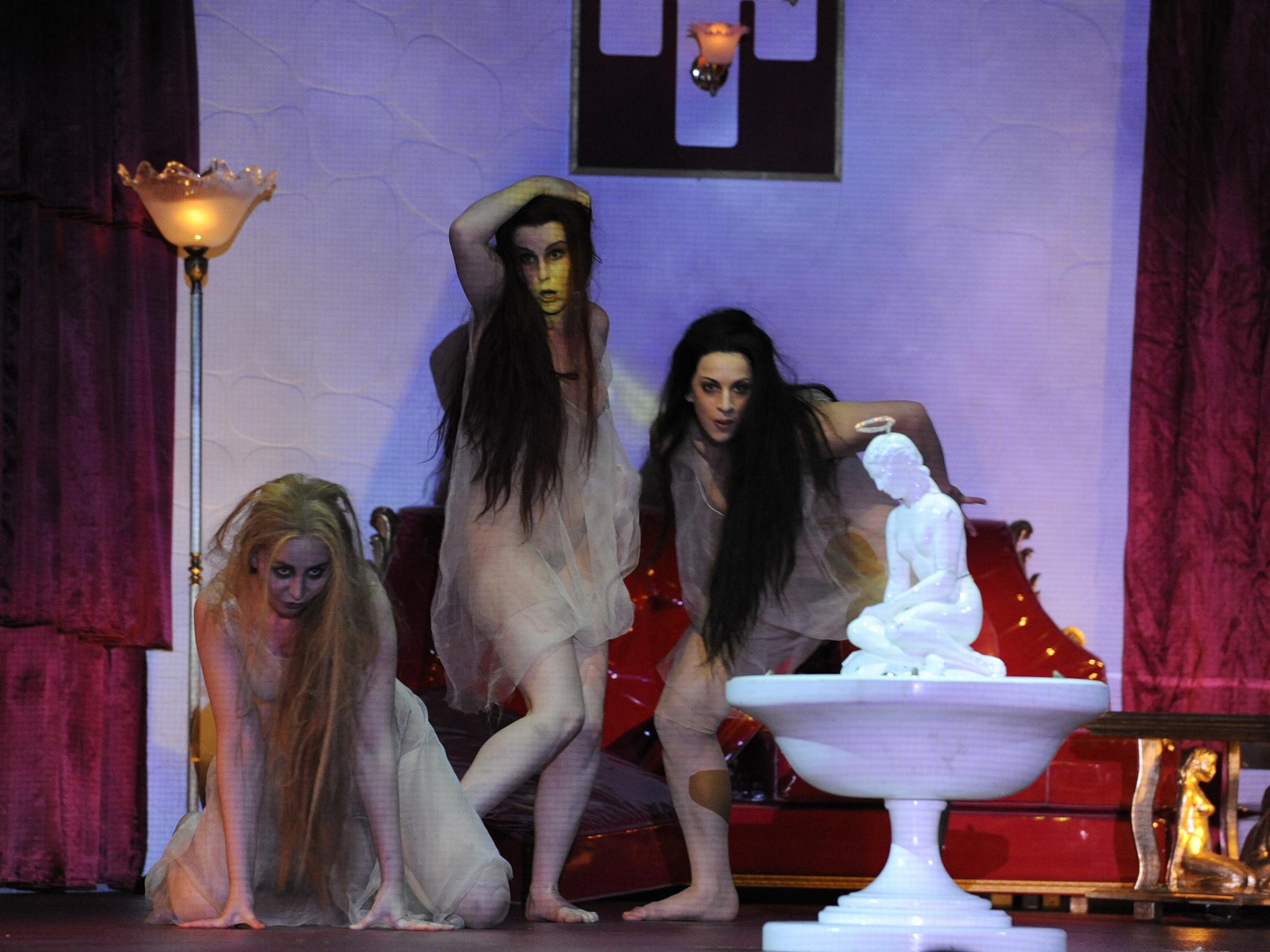Glyndebourne's Hamlet: Why British audiences have turned to unconventional opera
'Hamlet', which goes on tour with a percussion section including sandpaper and aluminium foil, follows a great British tradition of wacky operas

Your support helps us to tell the story
From reproductive rights to climate change to Big Tech, The Independent is on the ground when the story is developing. Whether it's investigating the financials of Elon Musk's pro-Trump PAC or producing our latest documentary, 'The A Word', which shines a light on the American women fighting for reproductive rights, we know how important it is to parse out the facts from the messaging.
At such a critical moment in US history, we need reporters on the ground. Your donation allows us to keep sending journalists to speak to both sides of the story.
The Independent is trusted by Americans across the entire political spectrum. And unlike many other quality news outlets, we choose not to lock Americans out of our reporting and analysis with paywalls. We believe quality journalism should be available to everyone, paid for by those who can afford it.
Your support makes all the difference.Opera is an art form widely thought of as difficult, elitist and stuffy. Forget that. More than any other art form, in Britain over the past 35 years at least, it has become entertaining and provocative and, quite often, downright wacky.
One of the very best examples of this, Glyndebourne’s acclaimed adaptation of Hamlet from this year’s festival, is about to go on tour. And audiences, at considerably cheaper ticket prices than the summer festival, will be able to see for themselves, not just excellent performances and a fast-paced thriller of a pared-down script, but also strange goings-on in the orchestra pit and auditorium.
To help give the appearance of the ghost an appropriate spookiness, in the percussion section, frying pan, sandpaper, foil, plastic bottles and stones are all used. There’s a rubber ball in there too somewhere, but let’s not give too much away.
There is also liberal scattering of the chorus not just on the stage, but into the pit and into surprising places in the auditorium itself. In this version from composer Brett Dean and librettist Matthew Jocelyn, the audience should not presume to know where the music is coming from.

By modernising a traditional story and taking it to places operas didn’t used to go, Glyndebourne is actually following in what has become a curious British tradition. The opera house has itself taken the odd liberty in the past. The Californian bad boy of opera Peter Sellars cut all the dialogue from Mozart’s The Magic Flute in his 1990 production and inserted Californian crazies living rough on the edge of the freeway. Among the first-night audience was the former Prime Minister, Sir Edward Heath, who pronounced that what he had just seen was “not The Magic Flute” and went his way. Also deciding to go his way was Sir Peter Hall, who resigned as artistic director of Glyndebourne, complaining that he had not been consulted about the production.
Some years later in an interview with The Independent, Sellars gave an insight into why directors sometimes enrage audiences (and artistic directors and ex-Prime Ministers) with radical reinterpretations of classical opera. He said of that production being booed on the opening night: “Oh, that’s because audiences only clap what they expect to happen – though I think it’s more interesting for them to be surprised. Magic Flute is something they don’t usually deal with at all, because they ‘know’ it. But take away the landmarks, the standard set of pre-programmed responses, and it acquires a new kind of urgency that you have to deal with. And the view of America I provide isn’t what you get from, say, the Walt Disney corporation or Arnold Schwarzenegger. There’s isn’t a whole lot of inner life in Arnold Schwarzenegger. I’m interested in inner life.”
Besides, Sellars could be startlingly prescient. Back in the Eighties, he set another production, this time Mozart’s The Marriage of Figaro, with its domineering and sexually predatory count, in Trump Tower.
Perhaps the habit of directors to take traditional opera and give it the most unlikely setting and treatment was first widely noticed when the English National Opera, never shy of dynamic reinterpretations of classical opera, presented Tchaikovsky’s Mazeppa in 1984. With bodies hung on meat hooks, this became known as “The chain-saw Mazeppa”. That was no metaphor. The violence was indeed inflicted with with that very implement.

The Spectator’s critic wrote afterwards: “When the orgy of slashing closed the first act, I damned nearly threw up all over the chap sitting in front of me. And the fact that he happened to be the ENO’s director of productions suggests that there may be justice in this world after all.”
Of course, one is spoilt for choice when it comes to ENO productions that would puzzle their venerable composers. The curtain came up on Calixto Bieito’s 2002 production of Verdi’s A Masked Ball to show the 14 members of the chorus, playing conspirators, all with their trousers around their ankles, seated on 14 lavatories. Allied to a male rape scene, it all proved too much for tenor Julian Gavin. Originally hired for the production, he pulled out when he learnt about the rape scene and was told that he would have to appear naked. He said he was a family man and would not like his children to see the production.
But don’t think it’s just the “people’s opera” the ENO that takes liberties. Covent Garden is no stranger to the wild and sometimes ridiculous, though audiences are not always as tolerant as they are at the ENO. The Covent Garden production of Rossini’s Guillaume Tell introduced a gang rape that Rossini certainly had not envisaged and forced much booing from the audience, and soul-searching (and later self-censorship) by the Royal Opera House.

There was also booing when Covent Garden set Dvorak’s Rusalka in a brothel, not the usual habitat of the story’s mermaid. But then when ladies are in the water, directors at Covent Garden go a little strange. Richard Jones’s production of Wagner’s Ring had the Rhinemaidens in latex nude costumes. Did I say it’s mainly Britain that has specialised in bizarre productions of traditional operas? Thankfully, we were spared Calixto Bieito’s challenging production of Mozart’s light opera Die Entführung aus dem Serail, which treated Berlin audiences to nipple-slicing, masturbation and singers urinating on each other. At least, the singers could claim that drinking before the performance was artistically necessary.
With Glyndebourne’s Hamlet, at least, there is much more method than madness. Composer Brett Dean says of what he does with the percussion effects: “They have this inherent otherworldliness – take a tam-tam and stroke across the face of it with a hard rubber ball and it’s one of the most chilling and disconcertingly beautiful sounds imaginable.” He adds of the challenge of writing for sandpaper: “The particular colours and textures have settled through the performances. I’ve got clarinettists and trumpeters up there in the roof, who are also playing a pair of stones and also shake some aluminium foil.”
Audiences at a modern British opera production would expect nothing less.
‘Hamlet’ tours from 21 October, beginning at Glyndebourne before travelling to Canterbury, Norwich, Milton Keynes and Plymouth (www.glyndebourne.com)
Join our commenting forum
Join thought-provoking conversations, follow other Independent readers and see their replies
Comments